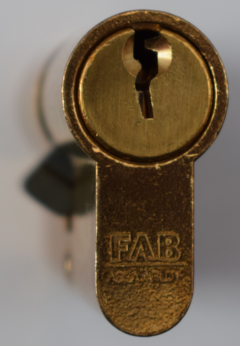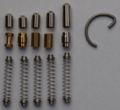FAB 100: Difference between revisions
mNo edit summary |
mNo edit summary |
||
| (One intermediate revision by the same user not shown) | |||
| Line 15: | Line 15: | ||
}} | }} | ||
'''FAB 100''' is a line of | '''FAB 100''' is a line of [[pin-tumbler]] lock [[cylinder]]s belonging to a resistance class 2 (according to CSN P EN1627:2000), which offers a basic security. It is recommended to secure garden gates, garden sheds and similar. The FAB 100 line is now superseded by the [[FAB 100RS]]. | ||
| Line 22: | Line 22: | ||
== FAB 100 == | == FAB 100 == | ||
=== | === Principles of operation === | ||
:''See also: [[Pin-tumbler#Principles_of_Operation|Pin-Tumbler (Principles of Operation)]]'' | |||
The lock contains five pin stacks, with two chambers containing standard drivers, two chambers contain [[RBC]] pins and there is a single spool. This configuration hints that the manufacturer perceives dynamic methods as a higher threat than picking (although RBC pins can frustrate picking as well). | The lock contains five pin stacks, with two chambers containing standard drivers, two chambers contain [[RBC]] pins and there is a single spool. This configuration hints that the manufacturer perceives dynamic methods as a higher threat than picking (although RBC pins can frustrate picking as well). | ||
| Line 29: | Line 31: | ||
The key is blanks are freely available and key can be cut or copied without any problem. | The key is blanks are freely available and key can be cut or copied without any problem. | ||
=== | === Disassembly instructions === | ||
To disassemble a double euro cylinder, use of a pinning shoe is the preferred method. | To disassemble a double euro cylinder, use of a pinning shoe is the preferred method. | ||
| Line 42: | Line 44: | ||
== FAB 100RS == | == FAB 100RS == | ||
=== | === Principles of operation === | ||
:''See also: [[Pin-tumbler#Principles_of_Operation|Pin-Tumbler (Principles of Operation)]]'' | |||
The lock contains five pin stacks that are in the same configuration as in the previous model, but what changed is the key and the core. The FAB 100RS key doesn't have a shoulder, and its function is taken over by the notch at the nose of the key along with the RS element in the core. The RS element is a simple piece of a steel wire, inserted into a groove in the core, blocking the key from being inserted too deep into the lock. | The lock contains five pin stacks that are in the same configuration as in the previous model, but what changed is the key and the core. The FAB 100RS key doesn't have a shoulder, and its function is taken over by the notch at the nose of the key along with the RS element in the core. The RS element is a simple piece of a steel wire, inserted into a groove in the core, blocking the key from being inserted too deep into the lock. | ||
| Line 49: | Line 53: | ||
The profile used is mildly paracentric, but doesn't add much to the protection against lockpicking. | The profile used is mildly paracentric, but doesn't add much to the protection against lockpicking. | ||
=== | === Disassembly instructions === | ||
Due to the RS element presence, use of a pinning shoe is no longer an option. | Due to the RS element presence, use of a pinning shoe is no longer an option. | ||
Latest revision as of 21:20, 24 March 2022
FAB 100
| FAB 100 | |
 | |
| Name | FAB 100 |
|---|---|
| Manufacturer | Fab |
| Lock Type | Cylinder |
| Lock Design | Pin-tumbler |
| Patent | CZ303220B6 |
FAB 100 is a line of pin-tumbler lock cylinders belonging to a resistance class 2 (according to CSN P EN1627:2000), which offers a basic security. It is recommended to secure garden gates, garden sheds and similar. The FAB 100 line is now superseded by the FAB 100RS.
FAB 100
Principles of operation
- See also: Pin-Tumbler (Principles of Operation)
The lock contains five pin stacks, with two chambers containing standard drivers, two chambers contain RBC pins and there is a single spool. This configuration hints that the manufacturer perceives dynamic methods as a higher threat than picking (although RBC pins can frustrate picking as well).
The profile used is mildly paracentric, but doesn't add much to the protection against lockpicking.
The key is blanks are freely available and key can be cut or copied without any problem.
Disassembly instructions
To disassemble a double euro cylinder, use of a pinning shoe is the preferred method.
Other possibility is to use a segmented follower, but that requires that both cores are pulled out a bit to allow a cam removal. Then a core should be rotated to approximately 4:30 or 7:30 o'clock position (135 degrees either clockwise or anti-clockwise) to prevent driver entering a gaps for the cam clutch. Then a segmented follower can be used to remove the core.
Gallery
FAB 100RS
Principles of operation
- See also: Pin-Tumbler (Principles of Operation)
The lock contains five pin stacks that are in the same configuration as in the previous model, but what changed is the key and the core. The FAB 100RS key doesn't have a shoulder, and its function is taken over by the notch at the nose of the key along with the RS element in the core. The RS element is a simple piece of a steel wire, inserted into a groove in the core, blocking the key from being inserted too deep into the lock.
There doesn't seem to be any security improvement the RS technology has to offer, it only prevents use of 3rd party blanks.
The profile used is mildly paracentric, but doesn't add much to the protection against lockpicking.
Disassembly instructions
Due to the RS element presence, use of a pinning shoe is no longer an option.
Segmented follower has to be used, but that requires that both cores are pulled out a bit to allow a cam removal. Then a core should be rotated to approximately 4:30 or 7:30 o'clock position (135 degrees either clockwise or anti-clockwise) to prevent driver entering a gaps for the cam clutch. Then a segmented follower can be used to remove the core.
Gallery
Vulnerabilities
The FAB 100 is vulnerable to one or more of the following:
- Lockpicking
- Decoding
- Key bumping - when RBC pins are worked around
- Impressioning
References









